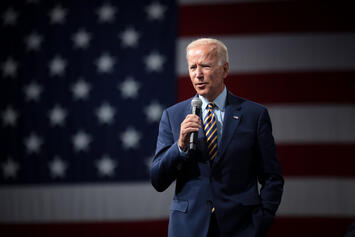
Joe Biden’s beleaguered presidency has fueled criticism of the man himself — his history of policy missteps, mental incapacity, and inept administrative style, as well as his family struggles. Whatever his personal flaws, though, the real cause of Biden’s incoherent and even contradictory policies lies not in his incompetence but in the contradictory nature of his agenda and his party.
Biden, despite decades in politics, remains something of a nowhere man, with no demonstrated, consistent worldview beyond expediency. He was elected because corporate power brokers saw him as the only viable alternative first to Bernie Sanders and Elizabeth Warren and then to the widely detested Donald Trump. These forces, joined by some labor unions and the older black establishment, pushed him over the top in a bizarre, heavily scripted campaign funded largely by the ultra-rich. The pandemic proved ideal for muzzling Biden’s gaffe machine.
In this tumultuous period, the Democratic Party could use a Bill Clinton or a Barack Obama, a leader who defines a coherent agenda and inspires voters. Some still believe that Biden’s reputation for compromise and bipartisanship is working, but his poll numbers suggest otherwise. The president’s approval rating, which was dropping before the Afghanistan debacle, is now heading toward the lows plumbed by his predecessor. Unless Biden somehow succeeds in elaborating a clear agenda, his presidency likely will continue to unravel.
Democratic Divisions and Contradictions
Like Caesar’s Gaul, the Democratic Party contains three distinct and often competing factions. The first consists of increasingly “woke” tech oligarchs and their Wall Street funders. They financed “a shadow campaign” for Biden, pouring millions into get-out-the-vote efforts and running media interference (most obviously in the Hunter Biden scandal) for his campaign.
Once elected, Biden duly inserted representatives of this class at the top of his administration. His cabinet is made up overwhelmingly of pedigreed, coastal metropolites (a third of the new cabinet went to Harvard). As the leftist Nation put it in a convincing story, under Biden the Democrats have become, without question, “the party of the rich.”
Yet the worsening inequality epitomized by Biden’s top picks runs against the Left’s ascendency within the party. Their agenda is not at all oligarch-friendly, with progressive demands for massive tax hikes — especially on capital gains — targeting a key Biden constituency. This progressive agenda — whose primary passions are gender fluidity, climate change, and “systemic racism” — has drawn its sustenance from the educated upper classes and not from the old middle- and working-class base of the party, which has been steadily shifting to the GOP for decades.
Some of these voters may have seen working-class Joe as a “reasonable guy,” enough perhaps to secure victory in key Midwestern states. But overall, as Democratic analyst Ruy Teixiera notes, the old party base is routinely ignored and even disdained by both the corporate and progressive wings, though they still constitute up to 44 percent of the total electorate. You see this on the local level: Democrats once ruled mining and manufacturing towns; today, they represent 41 of the 50 wealthiest congressional districts. The big losers inside the party debates have been the now widely disdained centrist Blue Dogs, generally from semi-rural, suburban or heavily working-class districts, whose numbers have fallen from nearly 50 in 2010 to 19 today.
The Tech Conundrum
The president (rightly, to my mind), has appointed some tough trust-busters including FTC chairperson Lina Khan, antitrust attorney Jonathan Kanter and White House aide Timothy Wu. Restoring competition to the tech marketplace should appeal to all but the most doctrinaire libertarians and of course the oligarchs themselves. But these efforts may be undermined and weakened at the highest levels of an administration largely staffed with former Obama officials, including Chief of Staff Ron Klain, Domestic Policy Council Director Susan Rice, and National Economic Council Director Brian Deese, all of whose personal coffers now brim with money at least partly derived from the Valley or Wall Street. Vice President Harris is particularly close to the oligarchy, especially Facebook, while National-Security Adviser Jake Sullivan has close ties to Microsoft.
Read the rest of this piece at National Review.
Joel Kotkin is the author of The Coming of Neo-Feudalism: A Warning to the Global Middle Class. He is the Roger Hobbs Presidential Fellow in Urban Futures at Chapman University and Executive Director for Urban Reform Institute. Learn more at joelkotkin.com and follow him on Twitter @joelkotkin.
Photo credit: Gage Skidmore via Flickr under CC 2.0 License.












